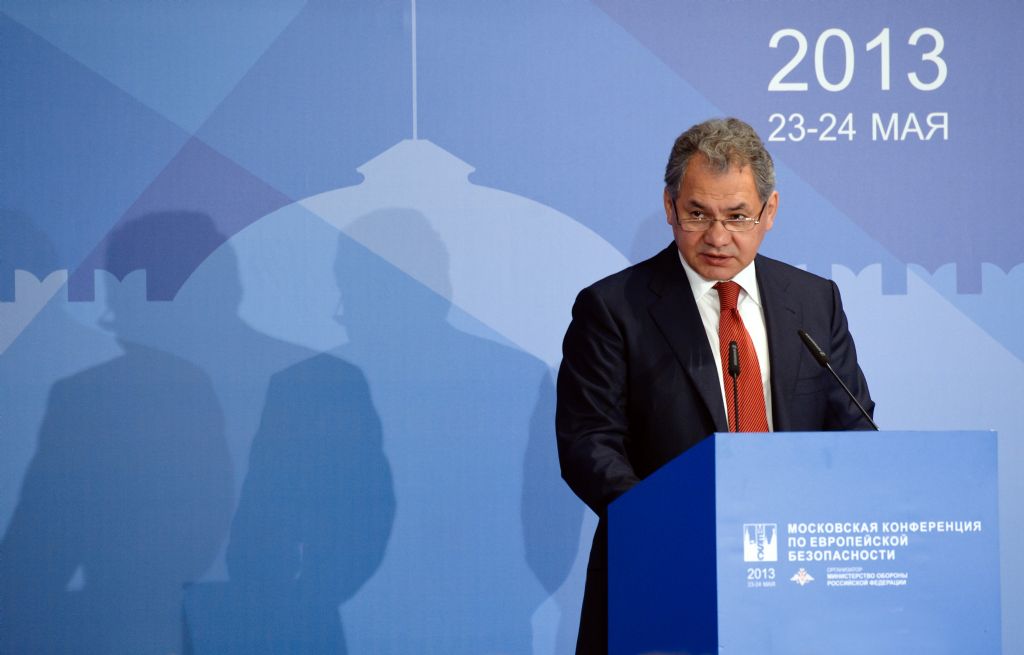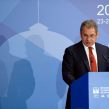
Moscow Security Conference Declares Death of CFE Treaty
Publication: Eurasia Daily Monitor Volume: 10 Issue: 105
By:

The Moscow European Security Conference on May 23–24 offered an opportunity for a wide range of defense officials and experts from member countries of the North Atlantic Treaty Organization (NATO) to exchange views on the future of Euro-Atlantic security with their Russian counterparts. Russia’s leading defense officials, however, offered little that was new or constructive other than holding out the prospect of security cooperation with the United States or NATO linked to post-2014 Afghanistan (see EDM, May 28, 31). Yet, such perspectives need to be examined in the context of Moscow’s recent moves on the crisis in Syria, its latest “surprise” inspection of the Armed Forces as well as the roots of Russian strategic thinking.
Moscow’s decision to send the sophisticated S-300 air defense system to Syria to prevent possible foreign intervention in the civil war was in response to the European Union lifting its arms embargo on the country. Russia soon followed this step by fulfilling another earlier contract to supply MiG-29 fighter jets to Syria (Interfax, June 2; see EDM, May 30). Three days after the Moscow conference, elements of the Russian Armed Forces were subject to a surprise inspection exercise involving the Aerospace Defense Forces (Vozdushno Kosmicheskaya Oborona—VKO), long-range aviation, military transport aircraft, the Air Force, as well as the air defense forces, including S-300 divisions that rehearsed repelling an air and space attack on Russia (Krasnaya Zvezda, May 27).
President Vladimir Putin highlighted continued disagreements Moscow has with the North Atlantic Alliance over ballistic missile defense (BMD), the “expansion” of NATO and the “control of conventional Armed Forces and their reduction” (https://mil.ru/konf_evrodefence/material_appearance.htm). This was underscored in the statements to the Moscow conference by both the defense minister, Army-General Sergei Shoigu, and the chief of the General Staff, Army-General Valery Gerasimov. Shoigu explained that Moscow still has questions for NATO members on the Alliance’s missions. NATO expansion and the development of its military infrastructure eastward serve, in Shoigu’s view, to “undermine” the more “positive results” in Russia’s relations with the Alliance. The defense minister then added that attempts to “restrain Russia” had resulted in the “death” of the Conventional Forces in Europe (CFE) Treaty. Naturally, a similarly sobering assessment was offered by Gerasimov, who also downplayed the possibility of further nuclear arms cuts (https://mil.ru/konf_evrodefence/material_appearance.htm).
Moreover, Foreign Minister Sergei Lavrov told the conference that the security of all countries in the Euro-Atlantic area is influenced by a “range of factors.” Lavrov said these include “growing military-political instability,” expanded areas of conflict or turbulence, and the “turmoil” in the Middle East and North Africa. He referred to “international terrorism,” “cross-border crime,” “illegal weapons” transit, as well as “inter-religious” and “inter-civilizational” tensions. Again, Lavrov noted the “collapse” of the CFE Treaty and revamped earlier Russian calls for a new European security architecture. Deputy Defense Minister Anatoly Antonov told the conference that the CFE Treaty is “dead,” and that any effort to rebuild it would fail. “New mechanisms” are required to replace the existing security architecture rather than simply to adjust it, in Antonov’s view (https://mil.ru/konf_evrodefence/material_appearance.htm).
Addressing the issue of Moscow’s calls for a new European security system, Antonov made five observations:
1. The development of new weapons systems and the use of conventional military power by other leading powers have blurred the distinction between nuclear and non-nuclear weapons.
2. Restrictions on conventional arms, which were part of the CFE Treaty, have lost their meaning, as they no longer serve to prevent conflict.
3. An adequate level of security cannot be achieved unless all weapons types, defensive and offensive, are included in future arms agreements—ranging from unmanned aerial vehicles to military robotics.
4. Missile defense and space-based weapons have a destabilizing potential, especially when applied to short- or medium-range missiles.
5. A problem of “geography” has emerged in modern territorial defense, based on the use of forward-deployed units or special forces, which changes the dynamics of warfare (https://mil.ru/konf_evrodefence/material_appearance.htm).
Seen from Moscow’s perspective, the CFE Treaty is dead primarily due to the fact that the means and methods of warfare have changed and consequently displaced the treaty’s conceptual basis. To understand the underlying basis of these views, as well as what appears as Russian paranoia over BMD and its stance on Syria, demands careful reading of an article on the Syrian Civil War in which a range of themes are pursued by Army-General (retired) Yury Baluyevskiy, the former chief of the General Staff (2004–2008). Baluyevskiy’s starting point on the crisis in Syria is to remind his readers about the NATO bombing of Serbia in 1999 and more recently the Western intervention in Libya. Baluyevskiy laments the fact that following the collapse of Yugoslavia in 1991–1992 the West could not avoid military intervention in 1999. But he also characterizes this intervention as special, since, in his view, it had the hallmarks of “non-contact war” (https://nvo.ng.ru/polemic/2013-05-24/1_siria.html).
This theme reads large in his interpretation of the allied no-fly zone over Libya in 2011, which, he notes, even involved non-NATO Sweden offering air support. But there seemed a point at which then-Libyan President Muammar Gaddafi let the situation slip out of control. The balance was tipped without the use of ground forces. Here, the critical distinction for Baluyevskiy was the conflict moving from a “national” to an “international” one, denoted by Western intervention. The conflicts in Yugoslavia, Libya and Syria must be studied carefully in Russia in order to develop effective modern means to counter such types of operation. Baluyevskiy welcomes the recent creation in Russia of a Special Operations Command, and raises the over-arching necessity to prepare the Armed Forces for new types of conflict. Then, in an aside, he castigates the idea of “joint missile defense” as unworkable and derides the concept of “non-targeting” missile defense. Baluyevskiy says that when BMD is fully developed, the system will work in “micro-seconds,” rendering man “hostage” to the system (https://nvo.ng.ru/polemic/2013-05-24/1_siria.html).
The intersection between the drivers of views expressed by Russian defense officials during the Moscow conference, recent moves over Syria, and the thinking expressed by Baluyevskiy is precisely this: it reveals a high degree of continuity in Russian strategic planning. The face of modern military intervention has changed, and Moscow does not yet possess similar means and methods to conduct such operations. But drawing on lessons from 1999 and 2011, Moscow appears to be pursuing asymmetric means to avoid Syria slipping into an “international” phase of conflict. Putin’s Russia believes it cannot afford to be ignored in such decision making. And as Baluyevskiy makes clear, the NATO bombing of Serbia in 1999 continues to cast a long shadow over Moscow’s relations with the Alliance.




